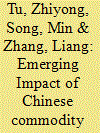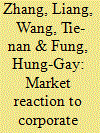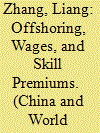| Srl | Item |
| 1 |
ID:
112249


|
|
|
|
|
| Publication |
2012.
|
| Summary/Abstract |
Despite three decades of reform, the electric power industry in China is still organised by a partial reformed plan system, where the investment to build capacity has been liberalised, but the prices and the production remain controlled by the state. This paper examines the pricing behaviour of the power supply in China, where the state attempts to balance the interest between the public and the electric power industry. The empirical evidence shows that the cost factors are critical to the electricity pricing in China, and that the bargaining mechanism, which sets the plan price, allows the power producers to face a soft budget constraint on their own costs.
|
|
|
|
|
|
|
|
|
|
|
|
|
|
|
|
| 2 |
ID:
125053


|
|
|
|
|
| Publication |
2013.
|
| Summary/Abstract |
In this paper we construct a set of indices that capture the special features of the Chinese commodity futures market for the period from January 2000 to December 2011 to analyze the general properties of China's commodity futures market. Using these indices we investigate the risk premiums of Chinese commodity futures and verify that the commodity futures can act as an effective diversification tool for Chinese asset management. It is found that the commodity futures can hedge both expected and unexpected inflation in China, and agricultural commodity futures are found to signal inflation 2 months beforehand. Finally, we explore the relationship between Chinese and US commodity futures markets in the years 2000 and 2010, and find that their interactions strengthen over time. Our research reveals an increasingly important role of the Chinese commodity futures market in both the domestic and the global economy. Some policy changes are suggested in response to this trend.
|
|
|
|
|
|
|
|
|
|
|
|
|
|
|
|
| 3 |
ID:
130982


|
|
|
|
|
| Publication |
2014.
|
| Summary/Abstract |
This study uses an event study methodology to examine how the Chinese market reacts to announcements of involvement in corporate social responsibility (CSR) by Southern Weekend (a Chinese newspaper) for Chinese firms from 2008 to 2012. Our results show significant and positive market reactions, supporting the instrumental stakeholder theory. We attribute the positive market response to social capital development and real growth options related to the CSR involvement by the Chinese firms.
|
|
|
|
|
|
|
|
|
|
|
|
|
|
|
|
| 4 |
ID:
181614


|
|
|
|
|
| Summary/Abstract |
Using detailed Chinese manufacturing firm production and trade data from 2000 to 2006, this study finds that offshoring significantly increases firms’ average wages. First, using the quasi-natural experiment of China's accession to the World Trade Organization, we investigate how a reduction in offshoring costs affects the manufacturing firm's wages and find that a productivity effect and a job-relocation effect are two possible channels. Second, the dynamic decomposition of industry-level wages indicates that the within-firm effect is 0.547, accounting for 31.5 percent of the total variation. Finally, a Mincer-type regression shows that offshoring also increases within-firm skill premiums. Our findings have strong implications for the government related to framing appropriate industrial policies to raise wages and reduce income inequality.
|
|
|
|
|
|
|
|
|
|
|
|
|
|
|
|